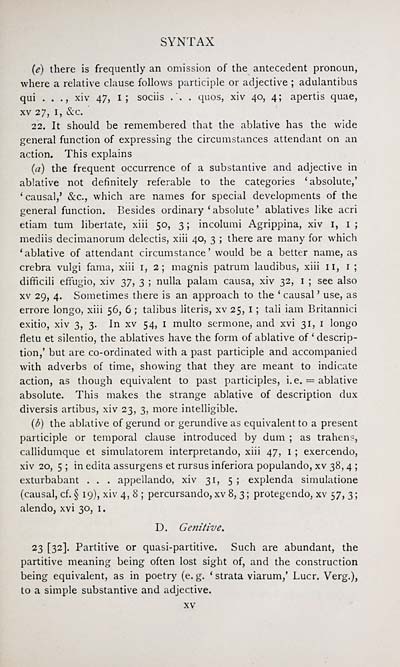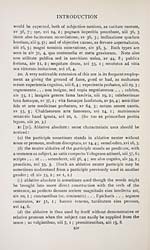Download files
Complete book:
Individual page:
Thumbnail gallery: Grid view | List view

SYNTAX
(e) there is frequently an omission of the antecedent pronoun,
where a relative clause follows participle or adjective ; adulantibus
qui . . ., xiv 47, i; sociis .'. . quos, xiv 40, 4; apertis quae,
XV 27, I, &c.
22. It should be remembered that the ablative has the wide
general function of expressing the circumstances attendant on an
action. This explains
(a) the frequent occurrence of a substantive and adjective in
ablative not definitely referable to the categories 'absolute,'
' causal,' &c., which are names for special developments of the
general function. Besides ordinary 'absolute' ablatives like acri
etiam turn libertate, xiii 50, 3 ; incolumi Agrippina, xiv i, i ;
mediis decimanorum delectis, xiii 40, 3 ; there are many for which
'ablative of attendant circumstance' would be a better name, as
crebra vulgi fama, xiii i, 2; magnis patrum laudibus, xiii 11, i ;
difficili effugio, xiv 27> 3 ; nulla palam causa, xiv 32, i ; see also
XV 29, 4. Sometimes there is an approach to the ' causal ' use, as
errore longo, xiii 56, 6 ; talibus Uteris, xv 25, I ; tali iam Britannici
exitio, xiv 3, 3. In xv 54, i multo sermone, and xvi 31, i longo
fletu et silentio, the ablatives have the form of ablative of ' descrip-
tion,' but are co-ordinated with a past participle and accompanied
with adverbs of time, showing that they are meant to indicate
action, as though equivalent to past participles, i.e. = ablative
absolute. This makes the strange ablative of description dux
diversis artibus, xiv 23, 3, more intelligible.
(d) the ablative of gerund or gerundive as equivalent to a present
participle or temporal clause introduced by dum ; as trahen?,
callidumque et simulatorem interpretando, xiii 47, I ; exercendo,
xiv 20, 5 ; in edita assurgens et rursus inferiora populando, xv 38, 4 ;
exturbabant . . . appellando, xiv 31, 5 ; explenda simulatione
(causal, cf. § 19), xiv 4, 8 ; percursando, xv 8, 3; protegendo, xv 57, 3;
alendo, xvi 30, i.
D. Genitive.
23 [32]. Partitive or quasi-partitive. Such are abundant, the
partitive meaning being often lost sight of, and the construction
being equivalent, as in poetry (e.g. ' strata viarum,' Lucr. Verg.),
to a simple substantive and adjective.
XV
(e) there is frequently an omission of the antecedent pronoun,
where a relative clause follows participle or adjective ; adulantibus
qui . . ., xiv 47, i; sociis .'. . quos, xiv 40, 4; apertis quae,
XV 27, I, &c.
22. It should be remembered that the ablative has the wide
general function of expressing the circumstances attendant on an
action. This explains
(a) the frequent occurrence of a substantive and adjective in
ablative not definitely referable to the categories 'absolute,'
' causal,' &c., which are names for special developments of the
general function. Besides ordinary 'absolute' ablatives like acri
etiam turn libertate, xiii 50, 3 ; incolumi Agrippina, xiv i, i ;
mediis decimanorum delectis, xiii 40, 3 ; there are many for which
'ablative of attendant circumstance' would be a better name, as
crebra vulgi fama, xiii i, 2; magnis patrum laudibus, xiii 11, i ;
difficili effugio, xiv 27> 3 ; nulla palam causa, xiv 32, i ; see also
XV 29, 4. Sometimes there is an approach to the ' causal ' use, as
errore longo, xiii 56, 6 ; talibus Uteris, xv 25, I ; tali iam Britannici
exitio, xiv 3, 3. In xv 54, i multo sermone, and xvi 31, i longo
fletu et silentio, the ablatives have the form of ablative of ' descrip-
tion,' but are co-ordinated with a past participle and accompanied
with adverbs of time, showing that they are meant to indicate
action, as though equivalent to past participles, i.e. = ablative
absolute. This makes the strange ablative of description dux
diversis artibus, xiv 23, 3, more intelligible.
(d) the ablative of gerund or gerundive as equivalent to a present
participle or temporal clause introduced by dum ; as trahen?,
callidumque et simulatorem interpretando, xiii 47, I ; exercendo,
xiv 20, 5 ; in edita assurgens et rursus inferiora populando, xv 38, 4 ;
exturbabant . . . appellando, xiv 31, 5 ; explenda simulatione
(causal, cf. § 19), xiv 4, 8 ; percursando, xv 8, 3; protegendo, xv 57, 3;
alendo, xvi 30, i.
D. Genitive.
23 [32]. Partitive or quasi-partitive. Such are abundant, the
partitive meaning being often lost sight of, and the construction
being equivalent, as in poetry (e.g. ' strata viarum,' Lucr. Verg.),
to a simple substantive and adjective.
XV
Set display mode to: Large image | Transcription
Images and transcriptions on this page, including medium image downloads, may be used under the Creative Commons Attribution 4.0 International Licence unless otherwise stated. ![]()
| Early Gaelic Book Collections > Matheson Collection > Cornelli Taciti annalium > (19) |
|---|
| Permanent URL | https://digital.nls.uk/76567164 |
|---|
| Description | Items from a collection of 170 volumes relating to Gaelic matters. Mainly philological works in the Celtic and some non-Celtic languages. Some books extensively annotated by Angus Matheson, the first Professor of Celtic at Glasgow University. |
|---|
| Description | Selected items from five 'Special and Named Printed Collections'. Includes books in Gaelic and other Celtic languages, works about the Gaels, their languages, literature, culture and history. |
|---|

